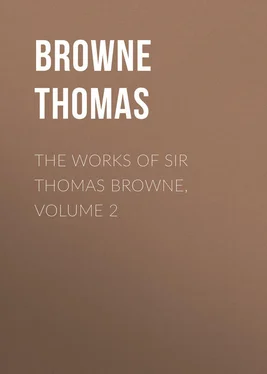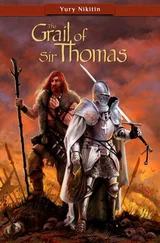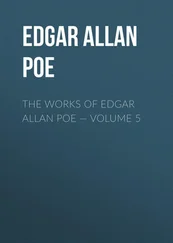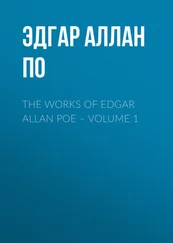Thomas Browne - The Works of Sir Thomas Browne, Volume 2
Здесь есть возможность читать онлайн «Thomas Browne - The Works of Sir Thomas Browne, Volume 2» — ознакомительный отрывок электронной книги совершенно бесплатно, а после прочтения отрывка купить полную версию. В некоторых случаях можно слушать аудио, скачать через торрент в формате fb2 и присутствует краткое содержание. ISBN: , Жанр: foreign_antique, foreign_prose, на английском языке. Описание произведения, (предисловие) а так же отзывы посетителей доступны на портале библиотеки ЛибКат.
- Название:The Works of Sir Thomas Browne, Volume 2
- Автор:
- Жанр:
- Год:неизвестен
- ISBN:http://www.gutenberg.org/ebooks/39961
- Рейтинг книги:5 / 5. Голосов: 1
-
Избранное:Добавить в избранное
- Отзывы:
-
Ваша оценка:
- 100
- 1
- 2
- 3
- 4
- 5
The Works of Sir Thomas Browne, Volume 2: краткое содержание, описание и аннотация
Предлагаем к чтению аннотацию, описание, краткое содержание или предисловие (зависит от того, что написал сам автор книги «The Works of Sir Thomas Browne, Volume 2»). Если вы не нашли необходимую информацию о книге — напишите в комментариях, мы постараемся отыскать её.
The Works of Sir Thomas Browne, Volume 2 — читать онлайн ознакомительный отрывок
Ниже представлен текст книги, разбитый по страницам. Система сохранения места последней прочитанной страницы, позволяет с удобством читать онлайн бесплатно книгу «The Works of Sir Thomas Browne, Volume 2», без необходимости каждый раз заново искать на чём Вы остановились. Поставьте закладку, и сможете в любой момент перейти на страницу, на которой закончили чтение.
Интервал:
Закладка:
Concerning its generation, that without all conjunction it begets and reseminates it self, hereby we introduce a vegetable production in Animals, and unto sensible natures, transfer the propriety of Plants; that is, to multiply within themselves, according to the Law of the Creation Gen. 1. , Let the earth bring forth grass, the herb yielding seed, and the tree yielding fruit, whose seed is in it self . Which is indeed the natural way of Plants, who having no distinction of sex, and the power of the species contained in every individuum , beget and propagate themselves without commixtion; and therefore their fruits proceeding from simpler roots, are not so unlike, or distinguishable from each other, as are the off-springs of sensible creatures and prolifications descending from double originals. But Animal generation is accomplished by more, and the concurrence of two sexes is required to the constitution of one. And therefore such as have no distinction of sex, engender not at all, as Aristotle conceives of Eels, and testaceous animals. And though Plant-animals do multiply, they do it not by copulation, but in a way analogous unto Plants. So Hermaphrodites although they include the parts of both sexes, and may be sufficiently potent in either; yet unto a conception require a separated sex, and cannot impregnate themselves. And so also though Adam included all humane nature, or was (as some opinion) an Hermaphrodite , yet had he no power to propagate himself; and therefore God said, It is not good that man should be alone, let us make him an help meet for him ; that is, an help unto generation; for as for any other help, it had been fitter to have made another man.
Now whereas some affirm that from one Phœnix there doth not immediately proceed another, but the first corrupteth into a worm, which after becometh a Phœnix, it will not make probable this production. Irregularities. For hereby they confound the generation of perfect animals with imperfect, sanguineous with exanguious, vermiparous with oviparous, and erect Anomalies, disturbing the laws of Nature. Nor will this corruptive production be easily made out in most imperfect generations; for although we deny not that many animals are vermiparous, begetting themselves at a distance, and as it were at the second hand (as generally Insects, and more remarkably Butter-flies and Silkworms) yet proceeds not this generation from a corruption of themselves, but rather a specifical and seminal diffusion, retaining still the Idea of themselves, though it act that part a while in other shapes. And this will also hold in generations equivocal, and such as are not begotten from Parents like themselves; so from Frogs corrupting, proceed not Frogs again; so if there be anatiferous Trees, whose corruption breaks forth into Bernacles, yet if they corrupt, they degenerate into Maggots, which produce not them again. For this were a confusion of corruptive and seminal production, and a frustration of that seminal power committed to animals at the Creation. The problem might have been spared, Why we love not our lice as well as our children? Noah’s Ark had been needless, the graves of Animals would be the fruitful’st wombs; for death would not destroy, but empeople the world again.
Since therefore we have so slender grounds to confirm the existence of the Phœnix, since there is no ocular witness of it, since as we have declared, by Authors from whom the story is derived, it rather stands rejected; since they who have seriously discoursed hereof, have delivered themselves negatively, diversly, or contrarily; since many others cannot be drawn into Argument, as writing Poetically, Rhetorically, Enigmatically, Hieroglyphically; since holy Scripture alledged for it duly perpended, doth not advantage it; and lastly, since so strange a generation, unity and long life, hath neither experience nor reason to confirm it, how far to rely on this tradition, we refer unto consideration.
But surely they were not well-wishers unto parable Physickεὐπόριστα., or remedies easily acquired, who derived medicines from the Phœnix; as some have done, and are justly condemned by Pliny ; Irridere est vitæ remedia post millesimum annum reditura monstrare ; It is a folly to find out remedies that are not recoverable under a thousand years; or propose the prolonging of life by that which the twentieth generation may never behold. More veniable is a dependance upon the Philosophers stone, potable gold, or any of those Arcana’s whereby Paracelsus that died himself at forty-seven, gloried that he could make other men immortal. Which, although extreamly difficult, and tantum non infesible, yet are they not impossible, nor do they (rightly understood) impose any violence on Nature. And therefore if strictly taken for the Phœnix, very strange is that which is delivered by Plutarch De sanitate tuenda., That the brain thereof is a pleasant bit, but that it causeth the head-ach. Which notwithstanding the luxurious EmperourHeliogabalus. could never taste, though he had at his Table many a Phœnicopterus, yet had he not one Phœnix; for though he expected and attempted it, we read not in Lampridius that he performed it; and considering the unity thereof, it was a vain design, that is, to destroy any species, or mutilate the great accomplishment of six days. And although some conceive, and it may seem true, that there is in man a natural possibility to destroy the world in one generation, that is, by a general conspire to know no woman themselves, and disable all others also: yet will this never be effected. And therefore Cain after he had killed Abel , were there no other woman living, could not have also destroyed Eve : which although he had a natural power to effect, yet the execution thereof, the providence of God would have resisted: for that would have imposed another creation upon him, and to have animated a second Rib of Adam .
CHAPTER XIII
Of Frogs, Toads, and Toad-stone
Concerning the venomous Urine of Toads, of the stone in the Toads head, and of the generation of Frogs, conceptions are entertained which require consideration. And first, that a Toad pisseth, and this way diffuseth its venome, is generally received, not only with us, but also in other parts; for so hath Scaliger observed in his Comment, Aversum urinam reddere ob oculos persecutoris perniciosam ruricolis persuasum est ; and Mathiolus hath also a passage, that a Toad communicates its venome, not only by Urine, but by the humidity and slaver of its mouth; which notwithstanding strictly understood, may admit of examination: for some doubt may be made whether a Toad properly pisseth, that is distinctly and separately voideth the serous excretion: for though not only birds, but oviparous quadrupeds and Serpents have kidneys and ureters, and some Fishes also bladders: yet for the moist and dry excretion they seem at last to have but one vent and common place of exclusion: and with the same propriety of language, we may ascribe that action unto Crows and Kites. And this not onely in Frogs and Toads, but may be enquired in Tortoyses: that is, whether that be strictly true, or to be taken for a distinct and separate miction, when Aristotle affirmeth, that no oviparous animal, that is, which either spawneth or layeth Eggs, doth Urine except the Tortois.
The ground or occasion of this expression might from hence arise, that Toads are sometimes observed to exclude or spit out a dark and liquid matter behind: which we have observed to be true, and a venomous condition there may be perhaps therein, but some doubt there may be, whether this is to be called their urine: not because it is emitted aversly or backward, by both sexes, but because it is confounded with the intestinal excretions and egestions of the belly: and this way is ordinarily observed, although possible it is that the liquid excretion may sometimes be excluded without the other.
Читать дальшеИнтервал:
Закладка:
Похожие книги на «The Works of Sir Thomas Browne, Volume 2»
Представляем Вашему вниманию похожие книги на «The Works of Sir Thomas Browne, Volume 2» списком для выбора. Мы отобрали схожую по названию и смыслу литературу в надежде предоставить читателям больше вариантов отыскать новые, интересные, ещё непрочитанные произведения.
Обсуждение, отзывы о книге «The Works of Sir Thomas Browne, Volume 2» и просто собственные мнения читателей. Оставьте ваши комментарии, напишите, что Вы думаете о произведении, его смысле или главных героях. Укажите что конкретно понравилось, а что нет, и почему Вы так считаете.












